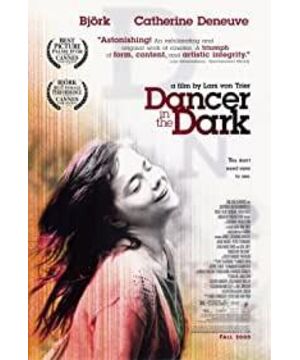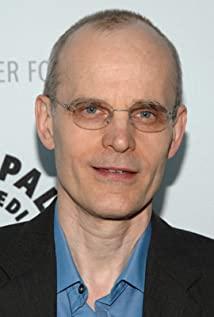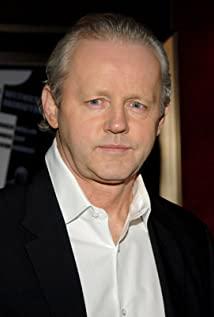- "Dancer in the Dark" director/screenwriter Lars von Trier
Wedge
This is an unusual and even alternative film, a It is a musical and dance film that pleases the audience without being grandstanding, a simple but great musical that violently collides with reality, a record that reflects the distance between reality and ideal, and a long hymn of faith that purifies the soul.
Filmed in 2000, "Dancer in the Darkness" was the last of director Lars von Trier's "Golden Heart Trilogy (or Trilogy of Conscience)", which was the most expensive in the history of Nordic cinema at the time. One of the film's films has aroused huge repercussions all over the world. The far-reaching influence of this film on filmmakers and viewers has not ended. It will be passed down and shake our hearts again and again.
When I recall watching "Dancer in the Darkness" in the classroom that day, I can't help but feel helpless. When the music of Selma (I prefer to call her real name Bjork) starts, when the dance first rotates or the body hits, the laughter one after another seems so sharp, even ruthless, it is a kind of ignorance and vulgarity . For most people, the aesthetics of movies are still limited to the hot and intense scenes of commercial films, the absurdity of comedies, the handsome men and beautiful women of musical films (especially Disney in recent years, such as the "High School Musical" series), etc. In terms of literary films, there is little acceptance. I can't help but remember that when I watched "Spring in a Small Town" and "A River of Spring Flows East", the laughter was not uncommon. Was it because the actors' performance skills in those days were more exaggerated like a stage play? In fact, many actors today (such as Chen Jianbin) are also from the drama, so the romance of the stage drama cannot be appreciated, and it can only be silently sad.
I have always believed that college students should be advanced young people with rich culture. They should not be shackled by sad desires such as rights and material things. They should lower their proud heads and silence their hearts to do what they pursue. That's why I quit the student union, which in my opinion has "been old-fashioned" and has no free thinking, even if everyone and myself see the possibility of sitting on the "gold-plated" throne in a year's time. how big.
The general elective course selection for each semester is just like enrolling in a famous private high school in the middle school entrance examination. At six o’clock in the morning, someone gets up and goes to the computer room to wait in line to choose a course. Most people prefer courses that teachers give high marks and are easy to pass. After finally choosing a photography and film course that he likes in the fragile online education system of the Academic Affairs Office, Fang immediately closed his browser. In my opinion, love is easy. If you love something, there's no reason why it shouldn't be done.
Perhaps this is a paranoid idea of literary youth, and I have never regretted these choices.
In the same way, Lars von Trier exudes the same persistent charm as Selma under his lens, and is obsessed with music, life and life.
The title of the obsession
film uses a three-minute-long "canvas", and someone gave this description: "The mottled white canvas jumped on it, and the long trombone sounded quietly, when the audience was still imagining the scene according to the picture. When this painting is, the color gradually changed, and the shape in the painting also changed. From the little greenery sprouting on the vast snow field, to the deformed glasses, the golden ripples on the water surface under the sun, the petals of roses, the yellow Sunflowers, snow-capped mountains, yellow leaves falling by the roadside.” The
chaotic colors reminded me of Vincent van Gogh in 1890. The same persistent pursuit of art, Selma and Van Gogh experienced different but equally bitter situations. Marx's view of dialectical materialism tells the world that the world is changing. Some people say that the colors of the later scenes (roses, sunflowers, etc.) on this canvas appeared before the change, whether it is true or not, but the canvas does change. Selma, who used to be as confident and beautiful as a rose in a musical, and Van Gogh used to be as bright and bright as a sunflower in his paintings, but they were both obsessed with their own world, and the notes and pigments allowed them to enter their own illusions. A world that supports their whole soul.
It's just that their fates are like "yellow leaves falling on the roadside", quiet amid bullets and gallows, forever quiet, perhaps Selma is more like a dream of yellow beams, although there is no rich life, but it seems real and fantasy.
Last semester, I and a group of friends who love movies made our debut film - DV drama "One Letter". Since most of the main creative team are psychology students, we chose the theme of "dual personality", focusing on the protagonist's relationship with the film. The extreme fondness of a character in a book creates its own dual personality and dialogue with itself. As the producer of the film, I have a deeper understanding of the film as an actor, voiceover and music editor.
Seeing the first shot of "Dancer in the Darkness" made me mistake it for a home video recorder. I thought it was just a clip inserted in the film, but gradually I realized that the director seemed to deliberately shoot it hand-held. Hand-held shooting can better express the "documentary", and the "documentary" shooting method is more likely to make the viewer develop "empathy" (that is, feel the content expressed by the film), so as to have a more direct spiritual experience.
"Dancer in the Dark" is directed and written by Danish "Shocking" director Lars von Trier. He regards the old Danish predecessor Karl Dreyer as a spiritual mentor, and a domestic website has this description:
In February 1989, in a cemetery group in Frederiksberg, Denmark, a young man in his 30s was reverently praying. Kneeling in front of a simple tomb, his eyes were fixed on the small tombstone inscribed with the words: Carl Theodore Dreyer 1889-1968. On May 20, 1968, Karl Dreyer died of pneumonia and died here. As a Danish film director, he and the young people kneeling in front of the tomb and praying silently are the pride of the Danish national film. Karl Dreyer, Pasolini, Tarkovsky and other directors are unique and create pure images all their lives. They are the real masters in Trier's heart... Longing for the era of breaking the stereotype and rebuilding the law, this It is precisely the powerful psychological motivation for him to plan and maintain the "Dogma Manifesto" of pure images as a provocateur.
The Dogma Declaration (DOGMA95) is a declaration signed by Lars von Trier and four film directors including Thomas Windberg in 1995. Their attempt to restore the art of film essence. This manifesto is also known as the "Ten Commandments of Movies":
1. It must be shot on the spot, and no sets and props can be used. If you must use props, you must go where the props are present.
2. No additional sound effects can be added to the video unless the music is playing during the shooting.
3. Hand-held photography must be used.
4. Color must be used. No special lighting effects can be created. If the scene is too dark and the exposure is insufficient, you can add a dome light to the camera.
5. No filter can be used.
6. No superficial scenes, such as murder, are allowed.
7. The story must take place in a modern environment.
8. Type movies are not allowed.
9. The film format must be 35mm.
10. The director's name cannot appear at the beginning and end of the credits.
This manifesto is a pure white oath that Lars von Trier has defended throughout his life, to return the film to its original state. "Film is dying because it relies too much on technical packaging and packaging is abused. Should we be proud when fooling the audience is the highest task of filmmakers? This is what 100 years of cinema has brought Ours? The never-before-seen situation arises, with superficial action and superficiality being praised across the board, leading to an unprecedented barrenness of the film." Lars von Trier's thinking is in the same sense as my previous critique . Although the "Dogma Declaration (DOGMA95)" seems impossible, it gives us the opportunity to yearn for the younger generation of movies.
"Dancer in the Darkness" is the last part of the director's "Golden Heart Trilogy" following "Breaking the Waves" and "Idiot". It is said that the inspiration for the trilogy came from one of the director's favorite call stories:
a little girl goes to play in the forest. She has bread in her hand and toys in her pocket, but along the way she happily takes all the things one by one. Given to those around her, in the end she had nothing left and was destitute. But she said: "Everything will be fine for me, everything will be fine."
Indeed, Lars von Trier was following his spiritual mentor, Karl Dreyer, whose work continued his theme of "suffering women and the miracles of faith". It is especially worth mentioning that in 1995, when Lars von Trier was dying, his loving mother told him that the father he had called for thirty years was not his biological father. After giving birth to the father, the biological father showed an indifferent attitude. I think these circumstances are undoubtedly one of the factors that have a profound impact on the theme of his works.
The protagonist of the film Selma is played by Icelandic singer Bjork. We cannot just call her a singer, not only because of the experimental nature of her musical works, but because of her uninhibitedness and yearning for freedom in her soul. I first came into contact with Bjork in my first year of high school. When I was flipping through music magazines, I occasionally saw her related introduction, so I found her songs for audition on the Internet. Her voice is a kind of "ghost" sound, but it is different from Kabai The ethereal spirit of Lee Band or Faye Wong has a terrifying sense of oppression and calling.
When Bjork was 17 years old (1982), he formed his first band - Tappi Tikarass's two songs were included in the documentary "Rock in Reykjavik" of the Icelandic music new wave movement, which is considered to be the field The most promising genius, perhaps by coincidence, also revealed a very strong New Wave color in the work of Lars von Trier. Even though the conflict between the two people often broke out on the set, it still couldn't prevent such a shocking work from being born.
The film "Dancer in the Darkness" is Bjork's film debut, but it shows extraordinary acting talent, perhaps more because Bjork, like Selma in the film, has the same dedication to music that made her burst out. amazing performance. At the same time Bjork as the film's soundtrack, along with Richard Rogers, presented the wonderful music for this work that revives the European musical.
In addition to Selma, the film has several key roles. Among them, Cathy, the female foreman in the workshop, and Jeff, the driver who has a crush on her, are very kind people. They are like the sun shining in a corner of the darkness of reality, which can give Selma a little sense of security. Of course, we can't forget the kind female prison guard at the end of the film. And the community director who defied all odds to get Selma to star in the musical The Sound of Music.
Selma's landlord Bill and his wife are the key figures in the film's beginnings and turns, from the friendly treatment of Selma, to Bill's desperation after seeing and robbing Selma of Selma's savings for his son's surgery, and Bill's lies and weakness, which led to Selma eventually shooting Bill to death that ultimately led to the tragedy of this life.
I think that those obsessions of Selma can be slowly connected with the dances of the film.
dance! dance! dance!
The background of the story of "Dancers in the Darkness" is set in the bottom society of Washington, USA in the 1960s, especially in immigrants, a special group of Americans, which is more prone to a fierce conflict between ideals and reality. Many European immigrants came to the United States with the ideals of the American Dream.
The so-called American Dream is an ideal that believes that a better life can be achieved only through hard work in the United States, that is, people must be prosperous through their own work, courage, creativity, and determination, rather than relying on specific social classes and assistance from others.
Selma's good friend Cathy is a French immigrant, and Selma herself is a Czech immigrant. She came to the United States to save money and operate for her son Jean, who also suffers from hereditary eye disease. What cannot be indelible is her love for music. The yearning for the play, as she told her son that his surname was Lovi, a descendant of the great Czech musical performer. Selma worked hard day and night to save for surgery expenses for her son Gene. In addition to working in a processing factory, she also did small jobs, and stored the money she earned every day in a small box.
So the first dance was born in the factory. At that time, Selma was almost completely blind, and she struggled to complete a task that seemed to her to be able to be done only by feeling, but when she heard the sound and rhythm of the machine running and the metal colliding, she loved life. It was ignited again, and the beautiful music world in his heart can even be said to be a fantasy dream that can be displayed by dancing.
It's music! - Now dance! Listen, Cvalda You're the dancer You've got the sparkle in your eyes Look at me, entrancer! Clatter, crash, clack! Racket, bang, thump! Rattle, clang, crack, thud, whack, bam!
These rhythmic words fit the roar of the machine, sweeping away the repressed haze of the factory and replacing it with everyone's passion for life and work. This may be telling us that no matter how difficult life is, we should keep smiling and find joy in those boring things.
Selma's eyesight worsened, and she was eventually fired for damaging the factory's machinery. She met Jeff, who had a crush on her when she was walking home along the rails. When she heard the sound and rhythm of the rails rubbing against the wheels, Selma sang aloud about everything she "saw":
'I've seen it all, I have seen the trees,I've seen the willow leaves dancing in the breeze.…You've seen it all and all you have seen..You can always review on your own little screen. The light and the dark, the big and the small. Just keep in mind - you need no more at all. You've seen what you were and know what you'll be. You've seen it all - there is no more to see!' I 've
seen all kinds of life , I've seen spring flowers, autumn moon,
wind swaying willows and willows Lush, the world is so beautiful, lovers respect each other like guests, and the society is like this. That's enough, all this beauty has been reflected in Selma's pupils, everything has been sent to the cerebral cortex by her optic nerve, encoded and permanently stored. What kind of open-mindedness is this? Losing the job is not only the only chance to save for the operation fee for the son, but also the family's economic source. She hugged Jeff, the breeze ruffled her skirt, and she climbed onto the train and sang to the sky, whether she was singing about all the good things or asking God about the injustice that was being done to her.
When Selma learns that the money she saved for her son Gene has been stolen by the landlady Bill, she goes to Bill in hopes of recovering the vital money. Bill stole Gene's surgery bills in order to repay his wife's extravagant spending on a bank loan. The gun accidentally wounded Bill while Selma and Bill were fighting for the money purse, and Bill, who was also helpless, begged Selma to shoot him or she would not get the money. Selma cried and cried in pain, and eventually had a nervous breakdown that killed Bill. Music box music played in the room, and the third dance of the film came into being.
If I only could Shelter you From that pain Just to make it easier on you You are gonna have to find out for yourself...
Selma tapped Bill's forehead and Bill stood up smiling. In the singing, Selma asks Bill's forgiveness, Bill also admits that he hurt her too much, and she just did what she had to do, so for the sake of her son, please leave Selma quickly, even in the dance, the siren is getting closer, the girl The landlord also smiled at Selma from the wooden chair. In this piece of music like Christian comfort, she tolerated others, and others tolerated her. In particular, Selma's son Gene rode his bicycle around in circles, adding a touch of nostalgic warmth, that is, the group of shots where the landlord and his mother laughed together when Gene got the bicycle he especially wanted.
After Selma gets her purse back and walks down the road, she meets Jeff again. Jeff drives him to a small remote hospital, and Selma insists that Jeff not follow. She threw the bag in a nearby lake and walked into the hospital with the underpayment for the surgery, begging the doctor to operate on Gene, telling the doctor that his last name was Lowe.
Then Jeff took her to the rehearsal of the community musical "The Sound of Music", and she was torn between the director of the musical's repeated persuasion to stay and watch the rehearsal (to help the police hold Selma down) and her missing her son. But for Selma, the lure of the music was irresistible, and she was singing even as the police opened the door until she was arrested and taken away. This is the fourth dance.
In court, Selma did not defend herself too much. Even when the court asked her why she wanted to kill Bill, she said, "I promise he won't tell anyone." When the court asked her why the money was used, she said it was sent to his father, Lowe. And when the real Otrich Lowe showed up in court as a prosecution witness, I was desperate as a bystander. Without defending herself, and even in order to deceive the dignity of her friend, to keep a secret that was beneficial to her but no one would believe, Selma chose to remain silent.
Selma listened intently. The rustling of the recorder's pen and paper made her smell the music again. Alltrich Lowe and Selma danced a tap dance, "I've been waiting for you here!" The judge, the jury, Policemen, lawyers, prosecutors, all the people in the courtroom beat the beat and experience her joy.
The dance was terminated by the hammer in the hands of the judge, and Selma was sentenced to hang.
In prison, Selma was terrified, and she sang the line "When we're scared, think about the things we like" in "The Things I Like" on The Sound of Music. Death, loneliness, these fears were nothing to Selma compared to silence. She faintly heard the music of the church choir, which was the best comfort to her.
Finally, Selma walked to the gallows, but she dared not take a step. The well-meaning female prison guard taps the beat with her foot, which is the rhythm of Selma's end of life, Selma's last dance. Music gave her the strength to face death, and Selma conveyed this strength to the death row inmates who were sympathetic to her in the 107 steps to the end of her life. She embraced them and said goodbye to them, soothing their inner despair.
The noose was around Selma's neck, and she began to scream hysterically. And when he touched Gene's glasses that Cathy had thrown at her, she got the best relief, and Selma went quiet, knowing that her son's operation was a success. Sings a voice without regret, "I'm never alone, this is not the last song...". The wooden board under his feet loosened, and the singing stopped abruptly. Gene's glasses fell to the ground.
Tragedy should never be a miracle.
Nightmare
Selma says: Silence is golden.
This is the silence of the good, the silence of the humble, and the silence of the weak.
Not complaining about the injustice of life, not justifying the injustice of the verdict, not exposing the grievances of a friend (Bill) and degrading his dignity, not refuting his son's ridicule, not mistaken for Jeff's sincere love to repay his son, Selma used her own His hands and gradually blind eyes worked hard to repay his debt to his son. There is this dialogue in the film:
Jeff: [referring to Gene] Why did you have him? You knew he would have the same disease as you.
Jeff: (referring to Gene) Why did you have him? You know he will have the same disease as you.
Selma: I just wanted to hold a little baby in my arms
.
Perhaps without Jean, all these tragedies could not have been portrayed so tragically. It's just that who can't understand how much a mother expects the child she has, no one can tell whether Selma was irresponsible or what. But we all clearly understand that the end of the singing on the gallows, Selma's unfinished last second act and Gene's glasses are enough to prove that she has successfully paid for it with her life, and perhaps even after she refuses to take Xiao Luo's When the surgery fee was enough to save himself the lawyer fee, he had already completed the healing of his son and redeemed his soul at the cost of his own life.
The characters in "Dancer in the Darkness" are not good or evil, they are all kind, but they are blinded by the darkness of reality. The subtlety of the director is that even we are incapable of resenting Bill's "predatory" and lies, and as a bystander, we can only be silent and sad. Maybe after watching this movie in theaters, we will leave silently, silent for a night, a week or more. I began to think that everyone should be kind in their hearts (perhaps director Lars von Trier had the attitude of "let Freud's id die"), and all sins may be Forced by dark reality.
The director's "Dogma Manifesto" does not deliberately add lights, and the hand-held shooting mentioned earlier makes the picture of this film appear dim and depressing and tactile, and the storytelling thus appears more tragic, rather than lacking. Plots that embellished the plot too much were more mundane and bleak. However, when the film switches to the dance part, the color of the picture is rich and colorful, and the scene is also natural and beautiful. The sharp contrast between storytelling and dance highlights the conflict between reality and ideal.
This is the pure image that director Russ pursues throughout his life.
Indeed, darkness alludes to reality, and dance alludes to ideals and love. The reality is dark, but it does not completely deny it, because in addition to Selma's dedication to life and music, the love of Cathy, Jeff, the female prison guard and others is also interspersed in this tragedy.
Selma's obsession with music fanaticism (that is, her musical ideal) has set up a fantasy-like barrier for her soul in reality. Even if she gradually loses her eyesight and the ability to perceive the world with her eyes, she is still immersed in In his own music world, like a movie poster, a black poster, Selma dances under the faint spotlight. And that's where life's hope lies.
The overflowing love in Selma's body has painted the thickest and longest stroke for this tragedy. That love is not just a mother's love for her son Gene, not just a love for musicals, but an extension of an expansive love of life. She doesn't hate everyone, she loves everyone around her like an angel, whether it's close friends, those who hurt her, or even those death row prisoners who have nothing to do with it. Perhaps this is exactly what the little girl said at the end of the fable from which the director was inspired:
"Everything will go well for me, everything will be as good as ever."
The end of Selma's life on the gallows was the climax of a tragedy, It is also its destruction and destruction. After watching "Dancer in the Darkness", it may be like watching a set of home videos. It is so familiar that you can accompany the development of the plot and feel deep pain. If you think about it carefully, you may find some of it. Ideal and love are its vague theme. Ideals and love are great, and God will care for a lover who has ideals, and can wake up the indifference caused by the ups and downs in the pursuit of ideals. Director Selma and Russ use their passion to educate every one of us who are on the ideal path. An initial firm perseverance is the most valuable asset.
Selma: In a musical, nothing dreadful ever happens.
Selma: In a musical, nothing dreadful ever happens.
In our journey of chasing ideals and love, nothing terrible can ever happen, it just requires our fearless spirit like borage. When we close our eyes, we should not see darkness, but the light of ideals and love, even if we are dancers in the darkness.
View more about Dancer in the Dark reviews










